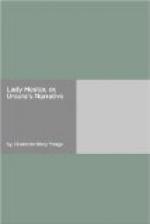“But it is you—you—you—Fulk!” said Emily, trying to creep and sidle up to him, white doe fashion. I believe nobody had ever called him by his Christian name before, and it made it sweeter to him, but still he did not give in.
“Ah! that’s all very well,” he said, and his voice was softer then, “but what would your mother say?”
“The same as I do,” said Emily, undauntedly. “How should it change one’s feelings one bit,” and she almost cried at being held back.
He did let her nestle up to him then, but with a sad sort of smile. “My child, my darling,” he said, “I ought not to allow this! It will only be the worse after!”
But just then a servant’s step made them start back, and a message came and brought word that Mr. Blake would be glad if Lord Torwood would step up.
Yes, my poor father was wandering in his speech, and very feverish, mixing up Adela and Faith Le Blanc strangely together sometimes, and at others fancying he was lying ill with his wound, and sending messages to Faith.
We sent for the doctor, but he could not do anything really. It had been a death-blow, though the illness lasted a full week. He knew us generally, and liked to see us, but he always had the sense that something dreadful had happened to us; and he would stroke my hand or Jaquetta’s, and pity us. He was haunted, too, by the sense that he ought to do something for us which he could not do. We thought he meant to make a will, securing us something, but he was never in a condition in which my brother would have felt justified in getting him to sign it. Indeed there was so little disease about him, and we thought he would get better, if only we could keep him free from distress and excitement; so we made his room as quiet as possible, and discouraged his talking or thinking.
Lady Hester came every day. My brother had sent for Mr. Eagles, our solicitor, to meet her the first time, and look at her papers.
He said he could not deny that it looked very bad for us. Of the original marriage there was no doubt; indeed, my father had told Torwood where to find the certificate of it, folded up in the secret drawer of his desk, with his commission in the army; and the register of Faith’s burial was only too plain. The only chance there was for us was, that her identity could not be established; but Mr. Eagles did not think it would go off on this. The whole of her life seemed to be traceable; besides, there was something about Hester that forbade all suspicion of her being a conscious impostor. Whether she would be able to prove herself my father’s daughter was another more doubtful point. That, however, made no difference, except as to her own rank and fortune. If the first wife were proved to have been alive till 1836, then little Alured was the only true heir to the title and estate, and, next after him, stood Hester Lea and her son.




